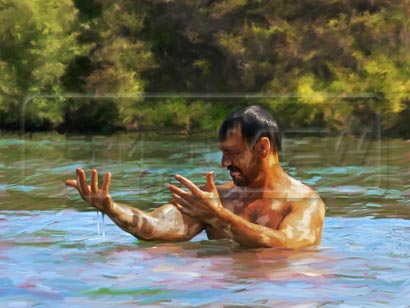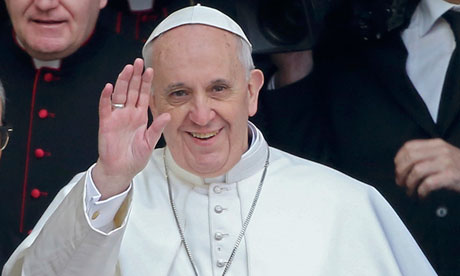I present here some of the more challenging statements of the interview
I am a sinner
I ask Pope Francis point-blank: “Who is Jorge Mario Bergoglio?” He stares at me in silence. I ask him if I may ask him this question. He nods and replies: “I do not know what might be the most fitting description.... I am a sinner. This is the most accurate definition. It is not a figure of speech, a literary genre. I am a sinner.”
“Yes, perhaps I can say that I am a bit astute, that I can adapt to circumstances, but it is also true that I am a bit naïve. Yes, but the best summary, the one that comes more from the inside and I feel most true is this: I am a sinner whom the Lord has looked upon.”
Consultation is very important
“Over time I learned many things. The Lord has allowed this growth in knowledge of government through my faults and my sins. So as Archbishop of Buenos Aires, I had a meeting with the six auxiliary bishops every two weeks, and several times a year with the council of priests. They asked questions and we opened the floor for discussion. This greatly helped me to make the best decisions. But now I hear some people tell me: ‘Do not consult too much, and decide by yourself.’ Instead, I believe that consultation is very important.
“The consistories [of cardinals], the synods [of bishops] are, for example, important places to make real and active this consultation. We must, however, give them a less rigid form. I do not want token consultations, but real consultations. The consultation group of eight cardinals, this ‘outsider’ advisory group, is not only my decision, but it is the result of the will of the cardinals, as it was expressed in the general congregations before the conclave. And I want to see that this is a real, not ceremonial consultation.”
The Church as the people of God
“The image of the church I like is that of the holy, faithful people of God. This is the definition I often use, and then there is that image from the Second Vatican Council’s ‘Dogmatic Constitution on the Church’ (No. 12). Belonging to a people has a strong theological value. In the history of salvation, God has saved a people. There is no full identity without belonging to a people. No one is saved alone, as an isolated individual, but God attracts us looking at the complex web of relationships that take place in the human community. God enters into this dynamic, this participation in the web of human relationships.”
Holiness
“I see the sanctity of God’s people, this daily sanctity,” the pope continues. “There is a ‘holy middle class,’ which we can all be part of, the holiness Malègue wrote about.” The pope is referring to Joseph Malègue, a French writer (1876–1940), particularly to the unfinished trilogy Black Stones: The Middle Classes of Salvation.
“I see the holiness,” the pope continues, “in the patience of the people of God: a woman who is raising children, a man who works to bring home the bread, the sick, the elderly priests who have so many wounds but have a smile on their faces because they served the Lord, the sisters who work hard and live a hidden sanctity. This is for me the common sanctity. I often associate sanctity with patience: not only patience as hypomoné [the New Testament Greek word], taking charge of the events and circumstances of life, but also as a constancy in going forward, day by day. This is the sanctity of the militant church also mentioned by St. Ignatius. This was the sanctity of my parents: my dad, my mom, my grandmother Rosa who loved me so much. In my breviary I have the last will of my grandmother Rosa, and I read it often. For me it is like a prayer. She is a saint who has suffered so much, also spiritually, and yet always went forward with courage.”
The Church is a home for all
“This church with which we should be thinking is the home of all, not a small chapel that can hold only a small group of selected people. We must not reduce the bosom of the universal church to a nest protecting our mediocrity. And the church is Mother; the church is fruitful. It must be. You see, when I perceive negative behaviour in ministers of the church or in consecrated men or women, the first thing that comes to mind is: ‘Here’s an unfruitful bachelor’ or ‘Here’s a spinster.’ They are neither fathers nor mothers, in the sense that they have not been able to give spiritual life. Instead, for example, when I read the life of the Salesian missionaries who went to Patagonia, I read a story of the fullness of life, of fruitfulness.”
The ability to heal wounds
“I see clearly,” the pope continues, “that the thing the church needs most today is the ability to heal wounds and to warm the hearts of the faithful; it needs nearness, proximity. I see the church as a field hospital after battle. It is useless to ask a seriously injured person if he has high cholesterol and about the level of his blood sugars! You have to heal his wounds. Then we can talk about everything else. Heal the wounds, heal the wounds.... And you have to start from the ground up.
“The church sometimes has locked itself up in small things, in small-minded rules. The most important thing is the first proclamation: Jesus Christ has saved you. And the ministers of the church must be ministers of mercy above all. The confessor, for example, is always in danger of being either too much of a rigorist or too lax. Neither is merciful, because neither of them really takes responsibility for the person. The rigorist washes his hands so that he leaves it to the commandment. The loose minister washes his hands by simply saying, ‘This is not a sin’ or something like that. In pastoral ministry we must accompany people, and we must heal their wounds.”
The Church is a mother and shepherdess
“How are we treating the people of God? I dream of a church that is a mother and shepherdess. The church’s ministers must be merciful, take responsibility for the people and accompany them like the good Samaritan, who washes, cleans and raises up his neighbour. This is pure Gospel. God is greater than sin. The structural and organisational reforms are secondary – that is, they come afterward. The first reform must be the attitude. The ministers of the Gospel must be people who can warm the hearts of the people, who walk through the dark night with them, who know how to dialogue and to descend themselves into their people’s night, into the dark- ness, but without getting lost. The people of God want pastors, not clergy acting like bureaucrats or government officials. The bishops, particularly, must be able to support the movements of God among their people with patience, so that no one is left behind. But they must also be able to accompany the flock that has a flair for finding new paths.”
Proclaim the Gospel
“We need to proclaim the Gospel on every street corner,” the pope says, “preaching the good news of the kingdom and healing, even with our preaching, every kind of disease and wound. In Buenos Aires I used to receive letters from homosexual persons who are ‘socially wounded’ because they tell me that they feel like the church has always condemned them. But the church does not want to do this. During the return flight from Rio de Janeiro I said that if a homosexual person is of good will and is in search of God, I am no one to judge. By saying this, I said what the catechism says. Religion has the right to express its opinion in the service of the people, but God in creation has set us free: it is not possible to interfere spiritually in the life of a person.”
About homosexuality
“A person once asked me, in a provocative manner, if I approved of homosexuality. I replied with another question: ‘Tell me: when God looks at a gay person, does he endorse the existence of this person with love, or reject and condemn this person?’ We must always consider the person. Here we enter into the mystery of the human being. In life, God accompanies persons, and we must accompany them, starting from their situation. It is necessary to accompany them with mercy. When that happens, the Holy Spirit inspires the priest to say the right thing.”
The confessional is not a torture chamber
“This is also the great benefit of confession as a sacrament: evaluating case by case and discerning what is the best thing to do for a person who seeks God and grace. The confessional is not a torture chamber, but the place in which the Lord’s mercy motivates us to do better. I also consider the situation of a woman with a failed marriage in her past and who also had an abortion. Then this woman remarries, and she is now happy and has five children. That abortion in her past weighs heavily on her conscience and she sincerely regrets it. She would like to move forward in her Christian life. What is the confessor to do?
“We cannot insist only on issues related to abortion, gay marriage and the use of contraceptive methods. This is not possible. I have not spoken much about these things, and I was reprimanded for that. But wh- en we speak about these issues, we have to talk about them in a context. The teaching of the church, for that matter, is clear and I am a son of the church, but it is not necessary to talk about these issues all the time.”
Focus on the essentials
“The dogmatic and moral teachings of the church are not all equivalent. The church’s pastoral ministry cannot be obsessed with the transmission of a disjointed multitude of doctrines to be imposed insistently. Proclamation in a missionary style focuses on the essentials, on the necessary things: this is also what fascinates and attracts more, what makes the heart burn, as it did for the disciples at Emmaus. We have to find a new balance; otherwise even the moral edifice of the church is likely to fall like a house of cards, losing the freshness and fragrance of the Gospel. The proposal of the Gospel must be more simple, profound, radiant. It is from this proposition that the moral consequences then flow.”
The proclamation of the saving love of God
“I say this also thinking about the preaching and content of our preaching. A beautiful homily, a genuine sermon must begin with the first proclamation, with the proclamation of salvation. There is nothing more solid, deep and sure than this proclamation. Then you have to do catechesis. Then you can draw even a moral consequence. But the proclaimation of the saving love of God comes before moral and religious imperatives. Today sometimes it seems that the opposite order is prevailing. The homily is the touchstone to measure the pastor’s proximity and ability to meet his people, because those who preach must recognise the heart of their community and must be able to see where the desire for God is lively and ardent. The message of the Gospel, therefore, is not to be reduced to some aspects that, although relevant, on their own do not show the heart of the message of Jesus Christ.”
Seeking God
“In fact, there is a temptation to seek God in the past or in a possible future. God is certainly in the past because we can see the footprints. And God is also in the future as a promise. But the ‘concrete’ God, so to speak, is today. For this reason, complaining never helps us find God. The complaints of today about how ‘barbaric’ the world is – these complaints sometimes end up giving birth within the church to desires to establish order in the sense of pure conservation, as a defence. No: God is to be encountered in the world of today.
“God manifests himself in historical revelation, in history. Time initiates processes, and space crystallises them. God is in history, in the processes.”
God is a God of surprises
“Because God is first; God is always first and makes the first move. God is a bit like the almond flower of your Sicily, Antonio, which always blooms first. We read it in the Prophets. God is encountered walking, along the path. At this juncture, someone might say that this is relativism. Is it relativism? Yes, if it is mis- understood as a kind of indistinct pantheism. It is not relativism if it is understood in the biblical sense, that God is always a surprise, so you never know where and how you will find him. You are not setting the time and place of the encounter with him. You must, therefore, discern the encounter. Discernment is essential.”
God is always in our lives, everybody’s life
“If the Christian is a restorationist, a legalist, if he wants everything clear and safe, then he will find nothing. Tradition and memory of the past must help us to have the courage to open up new areas to God. Those who today always look for disciplinarian solutions, those who long for an exaggerated doctrinal ‘security,’ those who stubbornly try to recover a past that no longer exists – they have a static and inward directed view of things. In this way, faith becomes an ideology among other ideologies. I have a dogmatic certainty: God is in every person’s life. God is in everyone’s life. Even if the life of a person has been a disaster, even if it is destroyed by vices, drugs or anything else – God is in this person’s life. You can, you must try to seek God in every human life. Although the life of a person is a land full of thorns and weeds, there is always a space in which the good seed can grow. You have to trust God.”
To grow in understanding
“Here, human self-understanding changes with time and so also human consciousness deepens. Let us think of when slavery was accepted or the death penalty was allowed without any problem. So we grow in the understanding of the truth. Exegetes and theologians help the church to mature in her own judgment. Even the other sciences and their development help the church in its growth in understanding. There are ecclesiastical rules and precepts that were once effective, but now they have lost value or meaning. The view of the church’s teaching as a monolith to defend without nuance or different understandings is wrong.”





